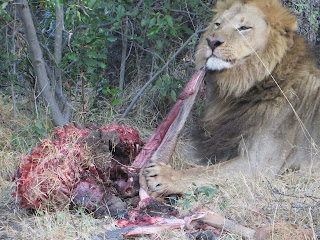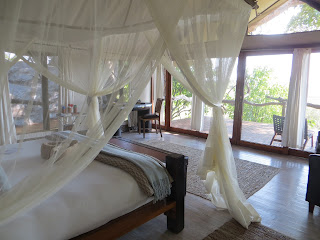After landing on the sandy airstrip, checking into the spectacular, intimate lodge, swallowing a glass of ginger lemonade, I am in a vehicle with my guide Delta. As we watch a female leopard sitting in a tree, I think, yes, yes, this is a good idea. I am reminded of Karen Blixen who once said 'here I am, where I ought to be.'
As if seeing this magnificent female leopard is not enough, as the sun starts to lower, she begins to vocalize. She is calling consistently and gazing off into the distance. She spent the day hunting and stashed her two month old cub in the bush and is now calling her in. Leopard cubs stay in their hiding spot, safe from predators, until their mother fetches them. I have seen this with lions, but surely we would be too lucky to see this two month old leopard cub. This is partially a defense mechanism of mine as I do not like to get my hopes up. Within moments, a tiny, beautiful baby leopard darts out of the bush. She is thrilled to have been released from her hiding spot and barrels energetically into her mom. For the next thirty minutes we are the only ones watching the baby leopard snuggling, playing and rolling over mom. She bats at her mom with her tiny paw, wanting to play, gnawing at her tail and ears, as the mother sits regally. The cub wanders about six feet away from her mom and then sprints toward her as if she is prey, somersaulting and flipping herself over her mom. A spectacular and joyful sighting.
(Click on photos to enlarge.)
That night the lions roared. It is an awesome, deep noise that signifies wildness. The next morning we are spending on a boat in the Delta, but on the way to the dock, we see two gorgeous male lions. They are resting after eating and one wanders to drink water in a small puddle. Over the next few days, we are lucky to see them at night and eating a kudu. There are three males and one female and each night they let their presence be known with magnificent roars.
The following evening, we found six wild dogs resting in the tall grass. They looked lean and hungry. As the sun lowered, they got up, and stared towards a group of impala across the grassland. As soon as the impala saw them, they darted into the bush. The dogs then spotted a bushbuck and the chase was on. They sprinted towards the buck who lept into the water. All we could see in the marsh area was its spiral horns moving across the water. Once on the other side, the bushbuck shot out of the water and into the bush. The dogs were livid. They paced and watched as their meal got away from them.
After giving up on the bushbuck, the dogs kept moving in search of prey. Wild dogs can travel great distances and run up to 35 miles per hour. Soon they found two groups of impala. The dogs kept looking back and forth to decide which to go after, and suddenly shot after one of the groups. As they sprinted towards the impala across a wet, marshy area, we chased after them in the vehicle. The sun was setting. One gets an incredible adrenaline rush watching a predator chase prey. With one hand I held onto the vehicle and my other was in the air as if riding a bucking bronco as we tried to keep up with them. Such fun. Dozens of zebra darted out of the dogs' way, through the marsh kicking up water as they ran. Our vehicle could not keep up with the dogs. The sounds of zebra, antelope and dogs splashing through the water was electrifying. The impala got away and the dogs were back to their search. The sun was now set and so we bid farewell to the dogs and headed back to camp.
Aerial shots of the Delta.
Baby elephant learning how to use his trunk.
African Jacana's (a spectacular looking bird) eggs, also known as the lily trotter, because he walks on lilies, or the Jesus bird because it looks like he walks on water. Have you ever seen such splendid eggs?
Baboon sitting on a perch, excellent views.
Above. Red-billed spurfowl.
Eagle owl. Africa's largest. He caught a frog; thus, is on the ground in the second shot snacking.
Papyrus below.
Camp above. Baboon catching a ride below.




































